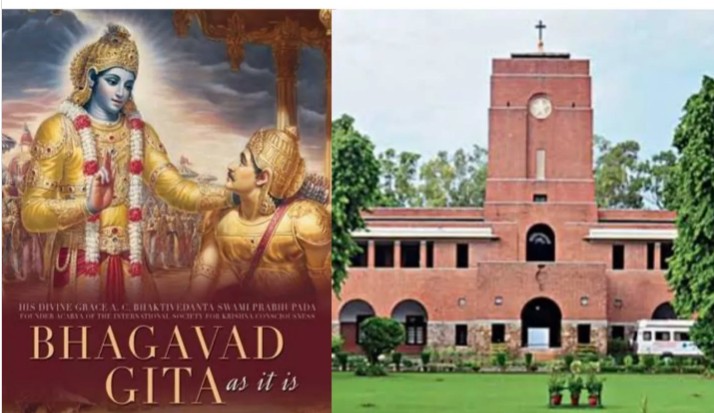
Follow WOWNEWS 24x7 on:

Delhi University’s recent proposal to introduce four value-addition courses centered on the Bhagavad Gita has ignited a nationwide conversation on academic neutrality, secularism, and the role of religious texts in public education. While the central government has defended the move as a step toward holistic learning, critics argue it risks privileging one worldview over India’s diverse intellectual traditions.
Key highlights from the proposal
- The university’s Value Addition Committee tabled four new courses: Gita for Holistic Life, Gita for Sustainable Universe, Leadership Excellence through Gita, and Gita: Navigating Life Challenges
- These courses are designed to be optional and accessible to all students, with a focus on applying Gita’s teachings to modern life
- The proposal also includes a course titled An Introduction to Viksit Bharat, aligned with the central government’s development vision
- Two general elective courses on tribal studies are also planned, expanding DU’s curriculum beyond religious texts
Central government’s stance
The Ministry of Education has backed the inclusion of the Gita-based courses, citing their philosophical depth and relevance to contemporary challenges. Officials argue that the Gita offers universal values such as resilience, ethical leadership, and self-awareness, which can enrich students’ personal and professional development.
Supporters of the move emphasize that the courses are not mandatory and are part of a broader effort to diversify value-based education. They also point to similar initiatives in other universities that incorporate religious or philosophical texts into elective modules.
Academic dissent and secular concerns
- Several elected members of DU’s Academic Council have submitted dissent notes, warning that the proposal undermines the secular ethos of the institution
- Critics argue that offering multiple courses based solely on the Gita limits exposure to India’s pluralistic traditions and fosters insular thinking
- Concerns have been raised about the lack of critical engagement with the text’s diverse interpretations—from Gandhi’s nonviolence to Godse’s justification for violence
- Some faculty members question the academic rigor and inclusivity of the proposed syllabi, urging the university to improve existing value-addition courses before expanding them
Broader curriculum tensions
The controversy comes amid other curriculum reforms at DU, including the implementation of the National Education Policy 2020 in postgraduate programs and the introduction of a PhD in Hindu Studies.
- Critics argue that the university’s focus on religious texts and nationalist themes may reflect ideological bias
- The proposal to require students to publish in Scopus-indexed journals or contribute to academic books has also been criticized as unrealistic given current infrastructure and funding constraints
- Faculty shortages and unclear syllabi for the final year of the Four-Year Undergraduate Program have added to concerns about academic preparedness
Public response and cultural implications
The debate over the Gita courses has spilled into public discourse, with social media users, educators, and political commentators weighing in. While some view the move as a celebration of India’s philosophical heritage, others see it as a step toward saffronization of education.
The outcome of DU’s Academic Council deliberations could set a precedent for how Indian universities balance cultural pride with academic pluralism. As the central government continues to promote value-based learning, institutions must navigate the fine line between inclusion and imposition.
Looking ahead
Whether the Gita courses are approved or revised, the conversation they’ve sparked is likely to influence future curriculum decisions across India. The challenge lies in crafting syllabi that honor tradition while embracing diversity—ensuring that education remains a space for inquiry, not indoctrination.
Sources: The Indian Express, Hindustan Times, Deccan Herald, National Herald India, The Telegraph India, New Indian Express.


